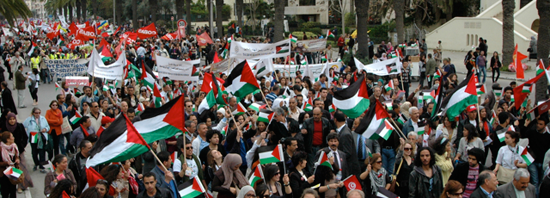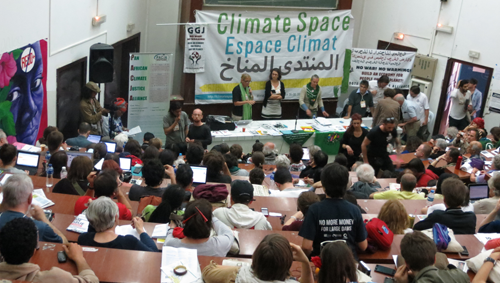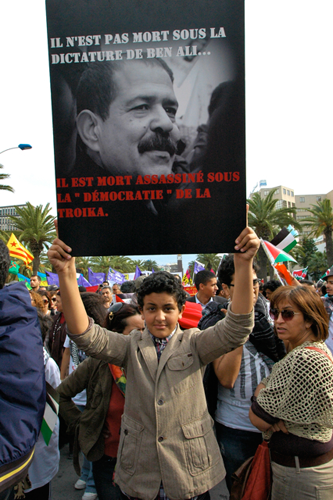by Kali Akuno, Malcolm X Grassroots Movement
The World Social Forum (WSF) in Tunisia marked a critical turning point in the Social Forum Process. Throughout its history, the World Social Forum has gathered under the auspices of progressive governments, buttressed by strong social movements. This precedent was established in the process of organizing the first World Social Forum in Porto Alegre, Brazil in 2001. The Brazilian Workers Party (WP) then governed Porto Alegre. The Workers Party is a progressive social force in Brazil that emerged from the popular social struggles of the 1970’s and 80’s to end the Military dictatorship that gripped the country since the 1960’s. The Social Forum in Mumbai, India in 2004 followed this same dynamic and pattern. Mumbai, which is located in the state of Maharashtra, was then governed by a coalition of progressive forces backed by strong social movements. The World Social Forum’s in Kenya and Senegal followed this same formula.
Tunis broke the mold. The difference in Tunisia was not a deliberate alteration of the established formula. The difference was the context. Tunisia is in the midst of a profound social transformation. In January 2011, Zine el Abidine Ben Ali, the dictatorial leader of Tunisia from 1987, was ousted by a broad alliance of social forces, known to many as the “Jasmine Revolution”. The Tunisian revolution resulted in the transfer of power from an oligarchic clique headed by Ben Ali to a representative government installed through the reestablishment of multi-party elections. The elections of October 2011 resulted in the election of the Tunisian version of the Muslim Brotherhood, the Islamist Ennahda Party.
Since the October 2011 elections, the struggle between conservative social forces like Ennahda and progressive social forces like the Popular Front has intensified and deepened. One expression of the heightening of contradictions between the progressive and conservative social forces was the assassination of Popular Front leader Chokri Belaid on February 6th, 2013. Belaid was an ardent critic of the Ennahda and one of the critical Tunisian organizers of the World Social Forum. Choki’s assassination, a mere month before the Tunisian World Social Forum, was a critical blow to the progressive and left forces in Tunisia, and considerable challenge to the World Social Forum.
Never before has a World Social Forum taken place in the immediate aftermath of a highly contested social revolution, dominated by conservative political forces. That the 2013 World Social Forum happened in this context was an expression of the profound contradictions of our present era and the many challenges that confront the World Social Forum as a space of international convergence for many of the progressive social movements of the world.
The social and political dynamics that contextualized the 2013 World Social Forum are not limited to Tunisia. Social contradictions are heightening and deepening throughout the world. And the outcomes of these are far from clear almost everywhere. As it relates to the World Social Forum, its organizing bodies must determine where the Social Forum should be going? Why? And how and who should make these decisions? These are critical questions, because it is clear that the established or traditional orientation that guided the organizing process of the Social Forum needs to be modified to sustain the strategic relevance of the Forum as a space of convergence for progressive forces throughout the world.
Several things that have become clear over the last several years. One is that the Social Forum process must become more strategic to rationally justify the concentration of resources it utilizes to conduct the convergences. Being more strategic in this context means being more intentional about what it is aiming to achieve. Just creating space for organizations and individuals to share is not enough. There are many signs that the Social Forum has outgrown this orientation. As the multiple crises confronting humanity become increasingly more catastrophic (capitalist imperialism, food sovereignty, and climate change), the Social Forum must be in a position to mobilize the forces that relate to it to engage in political action if it is to remain relevant.
 Two signs that many of the leading facilitative bodies of the World Social Forum have arrived at this conclusion are the spaces the International Council (IC) has facilitated opening for the Palestinian Liberation and Climate Justice movements. In November 2012, the International Council helped to facilitate the World Social Forum Free Palestine in Porto Alegre, Brazil, which was a very partisan position against Israeli colonialism and occupation, as well as a broad endorsement of the Palestinian Boycott, Divestment, and Sanctions (BDS) Movement.
Two signs that many of the leading facilitative bodies of the World Social Forum have arrived at this conclusion are the spaces the International Council (IC) has facilitated opening for the Palestinian Liberation and Climate Justice movements. In November 2012, the International Council helped to facilitate the World Social Forum Free Palestine in Porto Alegre, Brazil, which was a very partisan position against Israeli colonialism and occupation, as well as a broad endorsement of the Palestinian Boycott, Divestment, and Sanctions (BDS) Movement.
 Elements of the International Council have also played a substantive role in helping to support the Indigenous and Climate Justice movements challenge the United Nations (UN) facilitated climate change negotiations and polices like REDD + (Reducing Emissions from Deforestation and Forest Degradation in Developing Countries). Both of these movements assumed a central place at the World Social Forum in Tunisia.
Elements of the International Council have also played a substantive role in helping to support the Indigenous and Climate Justice movements challenge the United Nations (UN) facilitated climate change negotiations and polices like REDD + (Reducing Emissions from Deforestation and Forest Degradation in Developing Countries). Both of these movements assumed a central place at the World Social Forum in Tunisia.
However, changes to the general orientation of the World Social Forum are not without challenge. There are a number of forces on the International Council (IC) not in favor of centralizing the Social Forum in the activities and campaigns of the social movements. These forces primarily maintain that the World Social Forum should primarily be an “open space” where individuals, civil society, and social movements concentrate primarily on exchange. How this minority tendency struggles with the evolving majority tendency over the course of the next several years will play a critical role in determining the future viability of the World Social Forum.
Our Alliance, Grassroots Global Justice (GGJ), see’s the value in both orientations. However, if we have had a partisan position, it has always leaned towards giving more prominence to the social movement convergence processes that have always existed within the World Social Forum. These are the spaces in our experience that have facilitated grassroots internationalism and provide the greatest opportunity for the development and coordination of the international campaigns and solidarity networks needed to change the capitalist system to create the alternative systems we need to feed, house, clothe, care, and nurture each other in sustainable, life affirming ways.
We also believe that spaces for international dialogue and exchange remain essential. We need international spaces where Indigenous peoples, oppressed peoples, and the working class in all its complexity can come together, share our perspectives about the contradictions of our time, and through dialogue and exchange gain a deeper understanding of how to resolve them. Without convergences like the World Social Forum, it will be hard for many of the grassroots social movements of the world to have direct engagement, which we believe is essential.
If the Tunisian World Social Forum taught us anything, it was that progressive social forces have to remain vigilant. Our victories, such as occurred in Tunisia in January 2011, are not irreversible. It is imperative that we build broad, dynamic, and politically sophisticated social movements that can out organize and mobilize the politically conservative forces we have to contend with that are intent on maintaining the repressive capitalist-world system we live in and institute further regressive social policies and norms that seek to intentionally oppress women, queers, Indigenous peoples, particular racial and ethnic groups, and workers.
As the early victories of the “Arab Spring” clearly demonstrated, change can and will come, we just have to be prepared to speed it up and help it move in the directions we so desire. This will only come from mutual exchanges with our national and international peers, learning from our collective past, and organizing to the scale and scope necessary to implement our visions. Tunisia and all the previous World Social Forums have helped our alliance towards these aims, and we look forward to ensuring that the Forum and other processes of international convergence, networking, and solidarity are sustained to move us ever closer to where we need to go to create the world we need.

